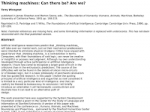
Chatbot listing, virtual agents, virtual assistants, chat bot directory, conversational agents, virtual human news, chatterbot list
NEWS: Chatbots.org survey on 3000 US and UK consumers shows it is time for chatbot integration in customer service!read more..
Thinking machines: Can there be? Are we?
 Artificial intelligence researchers predict that "thinking machines" will take over our mental work, just as their mechanical predecessors
Artificial intelligence researchers predict that "thinking machines" will take over our mental work, just as their mechanical predecessors were intended to eliminate physical drudgery. Critics have argued with equal fervor that "thinking machine" is a contradiction in terms.
Computers, with their foundations of cold logic, can never be creative or insightful or possess real judgment. Although my own understanding developed through active participation in artificial intelligence
research, I have now come to recognize a larger grain of truth in the criticisms than in the enthusiastic predictions. The source of the
difficulties will not be found in the details of silicon micro-circuits or of Boolean logic, but in a basic philosophy of patchwork rationalism
that has guided the research. In this paper I review the guiding principles of artificial intelligence and argue that as now conceived it
is limited to a very particular kind of intelligence: one that can usefully be likened to bureaucracy. In conclusion I will briefly
introduce an orientation I call hermeneutic constructivism and illustrate how it can lead to an alternative path of design.
New Comment
Only registered members are allowed to comment. or login
or login
